
JOURNAL OF ASSISTED REPRODUCTION AND GENETICS
Scope & Guideline
Elevating Standards in Assisted Reproductive Technologies
Introduction
Aims and Scopes
- Advancements in Assisted Reproductive Technologies (ART):
The journal publishes research on the latest techniques in ART, including in vitro fertilization (IVF), intracytoplasmic sperm injection (ICSI), and embryo cryopreservation, with a focus on improving clinical outcomes. - Genetic Testing and Counseling:
There is a strong emphasis on preimplantation genetic testing (PGT) for aneuploidy and monogenic disorders, including discussions on genetic screening protocols and their implications for patient counseling. - Fertility Preservation:
Research on fertility preservation strategies for cancer patients and other populations at risk of infertility is a key area of focus, addressing both clinical practices and the psychological aspects of decision-making. - Ethical, Legal, and Social Implications (ELSI):
The journal includes discussions on the ethical, legal, and social implications of reproductive technologies, promoting awareness and dialogue on these critical issues. - Interdisciplinary Research:
The journal encourages interdisciplinary studies that integrate reproductive medicine with genetics, molecular biology, and biostatistics, fostering innovative approaches to understanding and addressing infertility.
Trending and Emerging
- Integration of Artificial Intelligence (AI):
There is a growing trend in utilizing AI and machine learning technologies to enhance embryo selection, predict clinical outcomes, and improve laboratory efficiencies, indicating a shift towards data-driven approaches in reproductive medicine. - Focus on Epigenetics and Environmental Factors:
Research exploring the role of epigenetics and environmental influences on fertility and reproductive outcomes is gaining traction, highlighting the complex interplay between genetics and lifestyle. - Patient-Centered Care and Decision-Making:
Emerging themes emphasize the importance of patient perspectives, informed consent, and shared decision-making in fertility preservation and treatment options, reflecting a more holistic approach to reproductive health. - In Vitro Maturation (IVM) Techniques:
There is an increasing interest in IVM as a viable option for fertility preservation and treatment, particularly for women with conditions like polycystic ovary syndrome (PCOS), indicating a shift towards less invasive procedures. - Genomic Medicine in Reproductive Health:
The integration of genomic medicine into reproductive health is on the rise, with research focusing on the genetic basis of infertility, the implications of genetic carrier screening, and advancements in PGT.
Declining or Waning
- Traditional Fertility Treatments:
There is a noticeable decline in publications focused solely on traditional fertility treatments without the integration of genetic testing or advanced technologies, as the field increasingly prioritizes personalized and precision medicine approaches. - Single-Gene Disorders without Broader Context:
Research centered on single-gene disorders affecting fertility is becoming less frequent, with a growing focus on polygenic and multifactorial influences on reproductive health. - Generalized Ethical Discussions:
While ethical considerations are still important, there appears to be a shift away from broad ethical debates towards more specific discussions related to emerging technologies and their direct implications in clinical settings.
Similar Journals
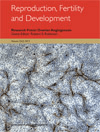
REPRODUCTION FERTILITY AND DEVELOPMENT
Advancing knowledge in reproductive science and developmental biology.Reproduction, Fertility and Development, published by CSIRO Publishing, is a prestigious journal that has been at the forefront of research in the fields of reproductive science, developmental biology, and related disciplines since its inception in 1989. With an ISSN of 1031-3613 and an E-ISSN of 1448-5990, this journal serves as a vital platform for disseminating innovative findings and methodologies that advance our understanding of reproductive processes and development in a variety of organisms. The journal is indexed in prominent databases, exhibiting a solid standing with a Q3 quartile ranking in both Animal Science and Zoology and Biotechnology, and covering 2023 rankings in multiple related categories. Operating from Australia, Reproduction, Fertility and Development embraces a commitment to enriching scholarly communication and fostering collaborative research efforts. Its focus on high-quality, peer-reviewed articles makes it an essential resource for researchers, professionals, and students seeking to stay abreast of the latest advancements and pivotal discussions in reproductive medicine and developmental biology.
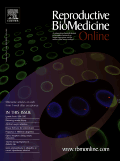
REPRODUCTIVE BIOMEDICINE ONLINE
Fostering excellence in reproductive medicine and scientific discourse.Reproductive Biomedicine Online, published by Elsevier, is a leading peer-reviewed journal that has established itself as a pivotal resource in the fields of Developmental Biology, Obstetrics and Gynecology, and Reproductive Medicine. With an impressive Impact Factor and a Q1 ranking in its respective disciplines as of 2023, this journal provides a platform for innovative research and comprehensive reviews that contribute to advancements in reproductive healthcare. The journal boasts rigorous Scopus rankings, placing it within the top tiers of its categories, which underscores its significance in shaping contemporary biomedical inquiry. Although not open access, it remains widely accessible through institutional subscriptions, making its wealth of knowledge available to researchers, clinicians, and students alike. Since its inception in 2000, Reproductive Biomedicine Online has been committed to fostering a deeper understanding of reproductive processes and biomedicine, ensuring that its content remains relevant and impactful in addressing challenges in reproductive health, thereby championing exceptional scientific discourse.

Gynakologische Endokrinologie
Advancing Women's Health Through EndocrinologyGynakologische Endokrinologie is a pivotal journal published by SPRINGER HEIDELBERG, dedicated to advancing the fields of endocrinology, obstetrics, gynecology, reproductive medicine, and pediatrics. With an ISSN of 1610-2894, this journal serves as a valuable platform for researchers and practitioners to disseminate their findings and explore emerging trends and treatments in the realm of women's health and endocrine disorders. Though currently positioned in the Q4 quartile across relevant categories, its mission is to foster scholarly discourse that bridges gaps in knowledge and enhances clinical practices. With a commitment to quality research, it provides a forum for innovative studies and case reports that could influence future healthcare strategies. Positioned in Germany, Gynakologische Endokrinologie aims to cater to a global audience, enhancing knowledge and collaboration in critical areas impacting women's health and hormone-related conditions.

Human Reproduction Open
Connecting researchers for impactful reproductive health solutions.Human Reproduction Open, published by Oxford University Press, is a prestigious open-access journal dedicated to advancing the field of reproductive health and medicine since its inception in 2017. With an E-ISSN of 2399-3529, the journal provides a vital platform for researchers, clinicians, and academics to disseminate innovative findings in obstetrics, gynecology, and reproductive medicine. It is recognized for its impactful contributions, holding an impressive rank of #3 out of 209 in Medicine - Obstetrics and Gynecology, #2 out of 90 in Medicine - Reproductive Medicine, and #1 out of 21 in Medicine - Embryology, placing it in the top percentiles of its respective categories. The open-access model ensures that research is freely accessible, fostering collaboration and knowledge sharing among professionals and students alike. With a commitment to high-quality, peer-reviewed publications, Human Reproduction Open plays a crucial role in shaping the future of reproductive health research and practice, serving as an essential resource for those dedicated to improving outcomes in this dynamic field.

International Journal of Fertility & Sterility
Advancing the Frontiers of Reproductive HealthThe International Journal of Fertility & Sterility, published by ROYAN Institute, is a leading academic platform dedicated to advancing knowledge in the fields of obstetrics, gynecology, and reproductive medicine. With an ISSN of 2008-076X and an E-ISSN of 2008-0778, this Open Access journal has been making significant contributions to the scientific community since its inception in 2007. Based in Tehran, Iran, the journal showcases rigorous research and promotes interdisciplinary collaboration, addressing critical topics related to fertility, sterility, and reproductive health. As of 2023, it holds an impressive Q2 ranking in Obstetrics and Gynecology and a Q3 ranking in Reproductive Medicine, underscoring its relevance and impact in the academic sphere, with Scopus ranks placing it at #67 in Obstetrics and Gynecology and #32 in Reproductive Medicine. The journal's commitment to accessibility and quality is reflected in its global readership, making it an essential resource for researchers, healthcare professionals, and students seeking to enhance their understanding of fertility issues and reproductive technologies.

Basic and Clinical Andrology
Exploring breakthroughs in reproductive medicine and urology.Basic and Clinical Andrology, published by BMC, is a leading open access journal dedicated to the advancement of knowledge in the field of reproductive medicine and urology. Since its launch in 2013, the journal has aimed to provide a platform for the dissemination of high-quality research, bridging the gap between basic science and clinical practice. With an impressive reputation evidenced by its Q2 ranking in both reproductive medicine and urology, it serves as a vital resource for researchers, healthcare professionals, and students looking to stay updated on the latest developments in andrology. The journal actively encourages submissions across a diverse range of topics, contributing to our understanding of male reproductive health issues, advancements in treatment protocols, and innovative therapeutic approaches. Located in the United Kingdom, Basic and Clinical Andrology plays a critical role in the global discourse on andrology, offering researchers an opportunity to share their findings with a broad audience committed to improving health outcomes in these crucial fields.
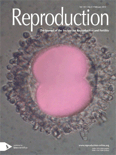
REPRODUCTION
Elevating the discourse in reproductive and developmental studies.REPRODUCTION, published by BIOSCIENTIFICA LTD, stands at the forefront of research in the fields of reproductive and developmental biology. With a focus on advancing our understanding of reproductive health and mechanisms, the journal has garnered an impressive reputation, consistently ranking in the first quartile for key categories including Embryology, Endocrinology, Obstetrics and Gynecology, and Reproductive Medicine in 2023. Notably, it holds an esteemed position in the Scopus rankings, with high percentiles that reflect its significant impact in the scientific community. The journal is committed to open access, promoting the broad dissemination of high-quality research to facilitate innovative discoveries and interdisciplinary collaboration. Situated in the United Kingdom, REPRODUCTION serves as a vital resource for researchers, professionals, and students eager to contribute to the evolving landscape of reproductive sciences and related fields.
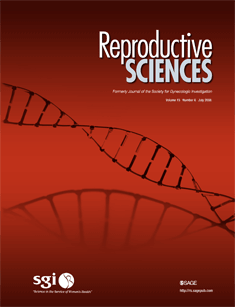
Reproductive Sciences
Advancing Knowledge in Reproductive HealthReproductive Sciences is a premier journal published by SPRINGER HEIDELBERG, dedicated to the field of obstetrics and gynecology. With its ISSN 1933-7191 and E-ISSN 1933-7205, the journal has established itself as a leading source of high-quality research and clinical insights since its inception in 2007, and continues to converge its scope into 2024. Currently ranked in the Q1 category for obstetrics and gynecology, it holds the 43rd position among 209 journals in the Scopus rankings, underscoring its influence and relevance within the medical community. This journal is particularly dedicated to advancing knowledge in reproductive health, providing a platform for innovative research and clinical practices through both traditional and open access options. Located in Switzerland with an address in Heidelberg, Germany, Reproductive Sciences is not just a publication; it is a vital resource for researchers, professionals, and students seeking to make impactful contributions to the field of reproductive health.

Reproductive Biology and Endocrinology
Advancing Knowledge in Reproductive Health and Endocrine ScienceReproductive Biology and Endocrinology, published by BMC, is a distinguished open-access journal established in 2003, catering to researchers and professionals in the interdisciplinary fields of reproductive biology, endocrinology, and related biomedical sciences. With a notable impact in 2023, the journal has achieved Q1 rankings in Obstetrics and Gynecology, Reproductive Medicine, and Endocrinology, alongside a Q2 ranking in Developmental Biology, establishing itself as a pivotal source of high-quality research and insights. The journal's commitment to freely accessible research promotes knowledge dissemination across its domains, which is crucial for advancing understanding of reproductive health and endocrine mechanisms. With a robust Scopus ranking showcasing its relevance—17th out of 209 in Obstetrics and Gynecology, and 8th out of 90 in Reproductive Medicine—it serves as an essential resource for academics and clinicians alike, facilitating innovative research and fostering collaboration within the global scientific community.
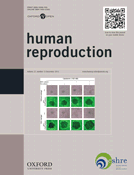
HUMAN REPRODUCTION
Innovating the landscape of reproductive medicine research.HUMAN REPRODUCTION is a prestigious academic journal published by Oxford University Press, dedicated to advancing the field of reproductive medicine. With an impressive impact factor highlighting its significance, the journal ranks in the top quartile (Q1) for Obstetrics and Gynecology, Rehabilitation, and Reproductive Medicine, showcasing its crucial role in disseminating high-quality research. Founded in 1986, it has become a key resource for researchers, practitioners, and students interested in cutting-edge developments and innovative practices in human reproduction. Despite not currently offering open access, the journal continues to publish a wealth of peer-reviewed articles that contribute substantially to clinical knowledge and practice. With Scopus rankings placing it among the top journals in its categories, HUMAN REPRODUCTION remains an essential platform for discussion and dissemination of vital findings impacting reproductive health globally.